Nine controversial state visits to the UK (original) (raw)
By Sunita Patel-Carstairs, news reporter
Donald Trump is finally on his state visit to the UK, more than two years after it was initially offered.
Mr Trump has had lunch with the Queen, afternoon tea with Prince Charles and has been honoured with a state banquet at Buckingham Palace.
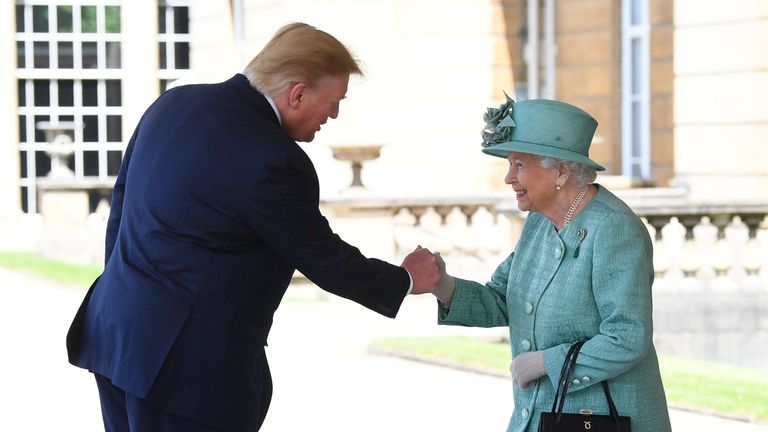
Image: The US president warmly embraced in the grounds of Buckingham Palace
It comes a year after his first gaffe-filled trip where he stood in front of Her Majesty as they inspected the Coldstream Guards at Windsor Castle.
Thousands of people have marched through central London to protest against the state visit.
Here are nine other controversial leaders who got an audience with the monarch.
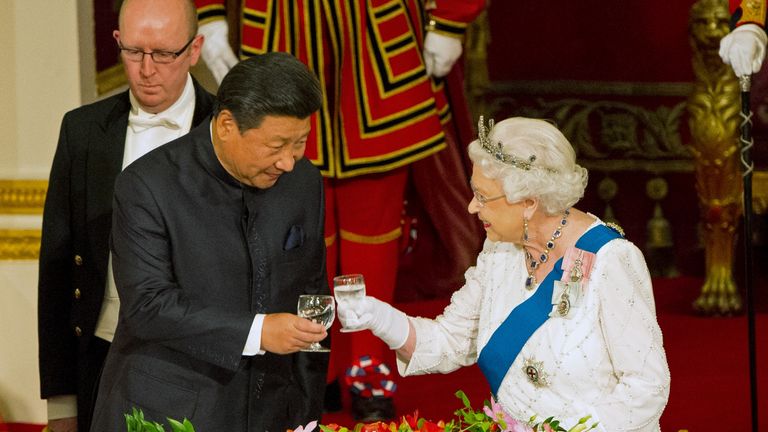
Image: Mr Xi with Queen Elizabeth at a state banquet at Buckingham Palace, October 2015
1. Chinese President Xi Jinping - 20-23 October 2015
There were clashes between human rights protesters and Chinese supporters during demonstrations ahead of Mr Xi's procession to Buckingham Palace with his wife Peng Liyuan. Police were forced to intervene and an 81-year-old Free Tibet protester was threatened with arrest after failing to move when officers asked her to. Mr Xi met Prince Charles and the Duchess of Cornwall, though they chose not to attend the state banquet. The prince has been critical of China's conduct in the past. Issues including cheap Chinese steel flooding the European market and crippling the UK steel industry and the security implications of allowing Chinese investment in nuclear power also plagued the state visit.
More from World
-
 Biden warns of an 'oligarchy' of wealth and power threatening US democracy
Biden warns of an 'oligarchy' of wealth and power threatening US democracy -
 Sir Keir Starmer to sign 100-year 'friendship' deal with Ukraine in first Kyiv visit since becoming PM
Sir Keir Starmer to sign 100-year 'friendship' deal with Ukraine in first Kyiv visit since becoming PM -
 British woman dies in French Alps after crashing into another skier
British woman dies in French Alps after crashing into another skier
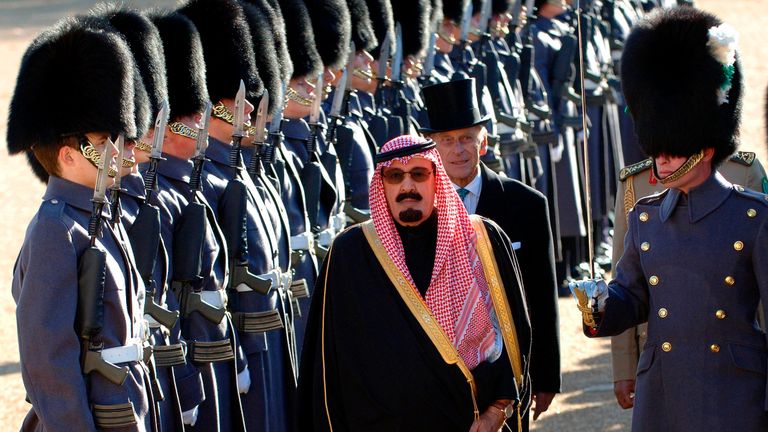
Image: King Abdullah and Prince Philip review a Guard of Honour in London, October 2007
2. King Abdullah of Saudi Arabia - 30 October - 1 November 2007
Saudi Arabia's King Abdullah's state visit to the UK also attracted protests and political controversy in Britain.
Demonstrators lined The Mall and called for the reopening of a corruption inquiry into a multi-billion dollar arms deal and shouted "shame on you" during a royal procession, while the Liberal Democrats boycotted official events over human rights. Protests by activists over the treatment of women and the gay community were also staged outside the Saudi embassy. The king sparked controversy even before he arrived in the UK, accusing British authorities of failing to act on Saudi intelligence which he claimed could have prevented the 2005 London bombings.
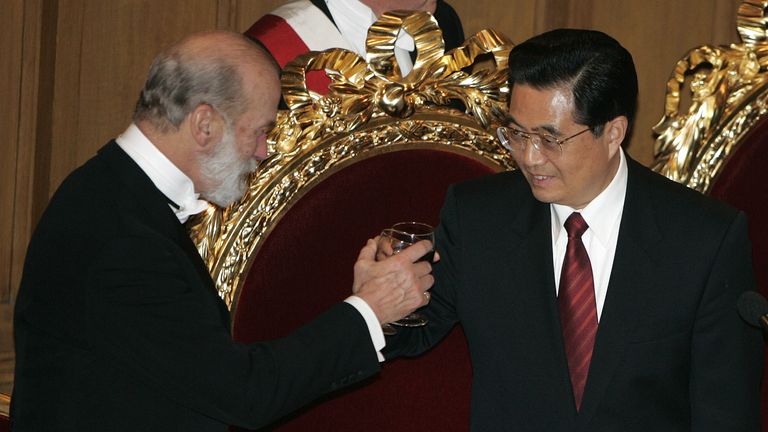
Image: Mr Hu makes a toast with Prince Michael of Kent at a Guildhall banquet, November 2005
3. Chinese President Hu Jintao - 8-10 November 2005
Pro-democracy activists greeted Mr Hu during his state visit with demonstrations over the one-party state's treatment of political dissidents and its occupation of Tibet. However, pro-Chinese government demonstrators also turned out wherever he went to voice their support for Mr Hu's leadership. Then then Liberal Democrat leader, Charles Kennedy, raised human rights issues with the Chinese leader when the pair met. Prince Charles did not attend the state banquet.
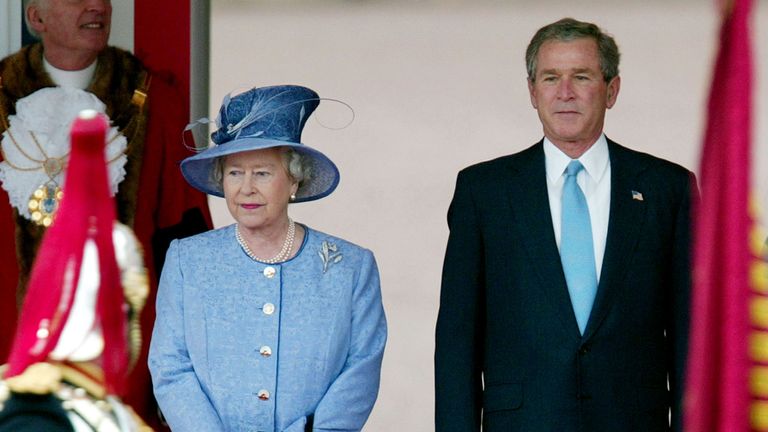
Image: Mr Bush with the Queen during his state visit, November 2003
4. US President George W Bush - 18-21 November 2003
Protests also marred George W Bush's state visit as tens of thousands of demonstrators took to the streets to protest against the war in Iraq - during which an effigy of Mr Bush was toppled in Trafalgar Square, echoing scenes of the fall of Baghdad more than six months earlier when a large statue of Saddam Hussein was brought down in Firdos Square. One protester was arrested for attempting to throw an egg at the presidential cavalcade. Up to £5m was reportedly spent on beefing up security for the four-day visit, which included calls for both Mr Bush and Prime Minister Tony Blair to resign over the Iraq conflict.
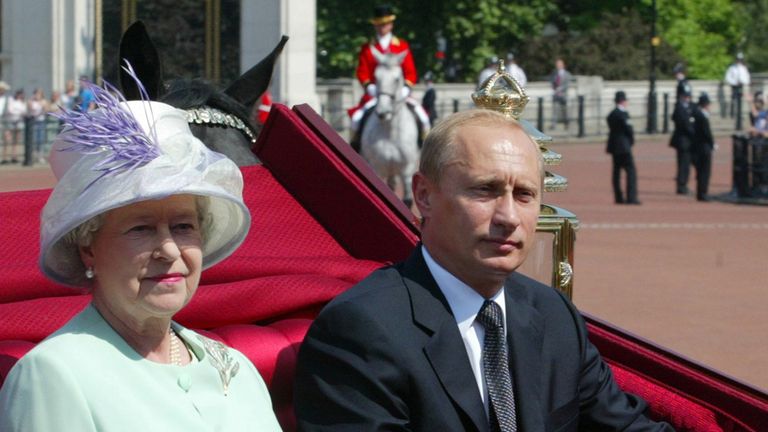
Image: Mr Putin rides alongside the Queen in a carriage, June 2003
5. Russian President Vladimir Putin - 24-27 June 2003
Mr Putin also enjoyed the pomp and circumstance that comes with state visits. But his trip - the first by a Russian leader since Tsar Nicholas I in 1843 - also featured demonstrations by human rights activists protesting against Russia's involvement in Chechnya and its treatment of other minorities. The visit also included a trip to Edinburgh, during which a protester was arrested after he threw himself in front of the president's motorcade along the Royal Mile. International concern over Mr Putin's support for Iran's nuclear programme also cast a shadow over the visit.
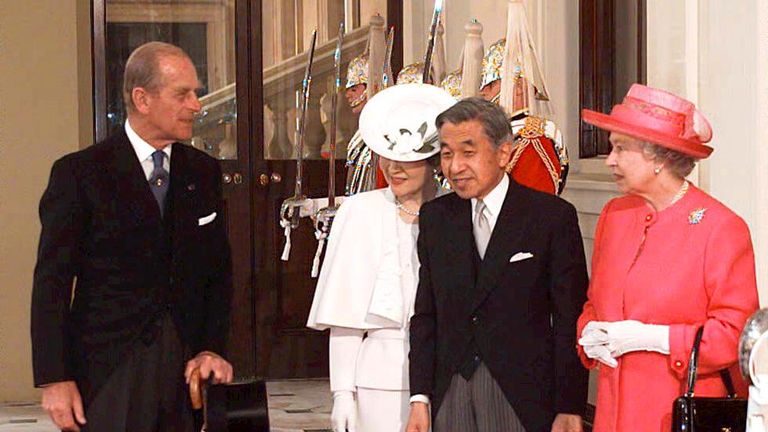
Image: Emperor Akihito during his state visit in May 1998
6. Japan's Emperor Akihito - 26-29 May 1998
Emperor Akihito was greeted with hostility from former British prisoners of war, who symbolically turned their backs on him, while others jeered, as he and the Queen passed by on The Mall in a horse-drawn carriage during a royal procession. Addressing the state banquet, the emperor spoke of his "deep sorrow and pain" over the suffering inflicted by his country during the Second World War, but he stopped short of apologising for the treatment of prisoners in work camps. A small group of PoWs also held a candlelit vigil outside the Japanese embassy to remember those who died. The emperor was also met with protests at Westminster Abbey and in Cardiff.
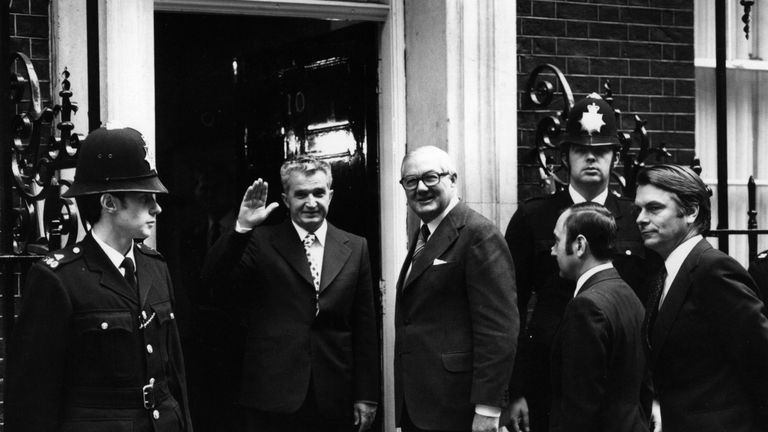
Image: Ceausescu with Prime Minister James Callaghan at No 10 Downing Street in 1978
7. Robert Mugabe - 17-20 May 1994
Zimbawe's Robert Mugabe was knighted during his 1994 visit to the UK, which had been arranged in an effort to improve relations between the two nations. However, his honorary knighthood was revoked in 2008 when news of him killing his opponents emerged. The honour had been bestowed despite reports of him slaughtering thousands in the 1980s as part of crackdowns on rebel groups. During the four-day visit, which included a state banquet, the Queen said: "Through your personal commitment to economic reform... your economy seems to be well on the way to recovery and sustainable growth." Mugabe had presided over the forced takeover of white-owned farms which helped ruin the country's economy, and his wife earned the nickname of "Gucci Grace" thanks to her penchant for shopping.
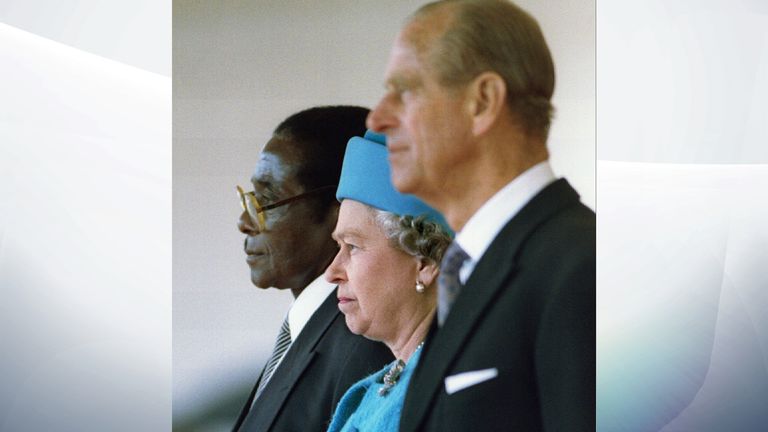
Image: Robert Mugabe with the Queen and Prince Philip in 1994
8. Romania's Nicolae Ceausescu - 13-16 June 1978
It was the first state visit by a Communist head of state to the UK and Romania was already well-known as one of the most corrupt and oppressive of the Soviet Union's Cold War satellite states. At the time, the Queen took drastic steps to avoid meeting the dictator, according to royal author Robert Hardman. "While walking her dogs in the Palace gardens, she spotted Ceausescu and his wife Elena heading in her direction. As the Queen told a lunch guest some years later, she decided the best course of action was to hide behind a bush rather than conduct polite conversation," he wrote. The Romanian leader was honoured by the government during his visit in an attempt to improve relations within Europe during the Cold War. However, his knighthood was revoked shortly after he was deposed in 1989.
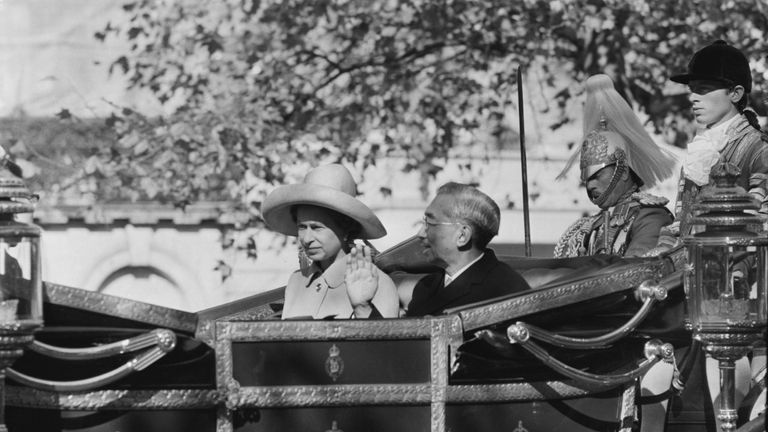
Image: Emperor Hirohito sits beside the Queen in a horse-drawn carriage in October 1971
9. Japan's Emperor Hirohito - 5-8 October 1971
Just like his son decades later, Emperor Hirohito, Japan's wartime head of state, was greeted by angry veterans and former British prisoners of war, who protested by standing in silence as he and Queen passed by them in an open horse-drawn carriage during his state visit to the UK. Thousands of protesters lined the route to Buckingham Palace. Some turned their back on the emperor and wore red gloves to symbolise those who had died in the camp, while others whistled the popular Second World War march, Colonel Bogey. "We cannot pretend that the past did not exist," said the Queen at a state banquet that evening. "We cannot pretend that the relations between our two peoples have always been peaceful and friendly. However, it is precisely this experience which should make us all the more determined never to let it happen again," she added. The emperor in his reply looked ahead to "joint efforts with you for the preservation of tranquillity in the world and the promotion of the welfare of mankind".